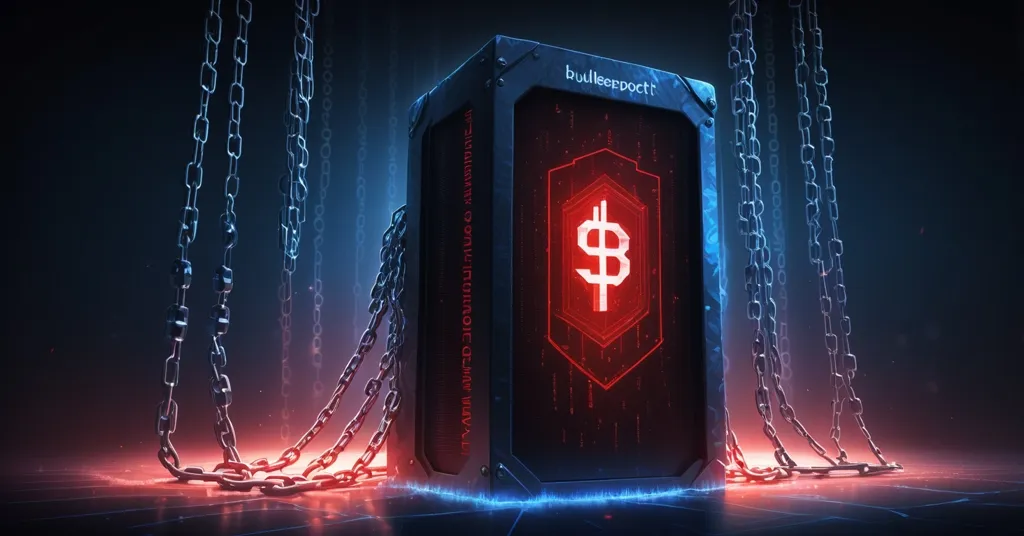US Treasury Targets Aeza Group, Freezes $350K Crypto Wallet in Cybercrime Crackdown

US Treasury Slams Aeza Group, Freezes $350K Crypto Wallet in Cybercrime Crackdown
The U.S. Treasury Department has launched a fierce assault on cybercrime, targeting the Russia-based Aeza Group, a bulletproof hosting provider notorious for sheltering ransomware gangs and darknet markets. With a TRON blockchain wallet packed with over $350,000 now frozen, this action aims to choke a vital financial lifeline for digital criminals and sends a clear warning: even the shadiest corners of crypto aren’t beyond reach.
- Aeza Group Sanctioned: U.S. Treasury’s OFAC hits Russia-based hosting provider for enabling ransomware and darknet operations.
- Crypto Funds Locked: A TRON wallet with $350,000 tied to Aeza is blocked, aiming to disrupt illicit cash flows.
- Global Enforcement: Sanctions also target Aeza affiliates and other bad actors linked to Russia and Iran in a wider cybercrime purge.
Unmasking Aeza Group’s Role in Digital Crime
On July 1, 2025, the U.S. Treasury, through its Office of Foreign Assets Control (OFAC), dropped a bombshell on Aeza Group for their role in cybercrime, targeting them for running bulletproof hosting (BPH) services. If you’re new to the term, think of BPH as the armored getaway car of the internet—servers and web spaces rented out to criminals, built to dodge law enforcement shutdowns and shrug off abuse complaints. These setups often hop between countries to stay off the grid, making them a royal pain to dismantle. Aeza, operating out of Russia, has been a safe haven for some of the dirtiest players in cybercrime, including ransomware outfits like BianLian, who encrypt victims’ data and demand crypto payments to unlock it, and malware peddlers behind info-stealers such as RedLine, Lumma, and Meduza that swipe personal data. They’ve also propped up BlackSprut, a Russian darknet market—a hidden online bazaar accessible only via special tools like Tor, peddling drugs, stolen credentials, and worse.
Aeza’s infrastructure doesn’t just host shady websites; it provides the anonymity and uptime criminals rely on to orchestrate attacks hitting U.S. businesses, hospitals, and even defense contractors. Ransomware is essentially a digital shakedown—hackers lock your systems, demand payment in Bitcoin or other cryptocurrencies, and disappear into the void. Without enablers like Aeza, pulling off these schemes gets a lot dicier. The Treasury’s focus on BPH providers, detailed in their official sanctions statement, is a strategic strike at the roots of cybercrime, aiming to tear down the framework before more damage piles up. But let’s not get ahead of ourselves—crushing one provider is like swatting a single fly at a landfill. These crooks adapt faster than a scam token moons.
Freezing the Funds: A $350K Crypto Wallet on Ice
The financial sting in this operation came with OFAC freezing a cryptocurrency wallet on the TRON blockchain, a network known for its dirt-cheap fees and lightning-fast transactions—perfect for anyone looking to move money with minimal oversight. For the uninitiated, TRON is a blockchain platform often used for decentralized apps and content sharing, but its low barriers and high transaction volume make it a magnet for illicit activity compared to Bitcoin’s more transparent ledger. Blockchain analytics firm Chainalysis traced this wallet’s activity, uncovering it as a hub for collecting payments and cashing out funds, with over $350,000 now inaccessible to Aeza. Freezing a wallet typically means blacklisting its address across compliant exchanges and services under U.S. jurisdiction, rendering the funds untouchable without risking legal repercussions.
This isn’t a mere slap; it’s a direct blow to Aeza’s ability to bankroll operations or pay off affiliates. Still, don’t bet on this being a knockout punch. Cybercriminals are slippery—expect them to spin up new wallets or pivot to privacy coins like Monero, which are designed to mask transaction details far better than TRON or Bitcoin. This cat-and-mouse game is endless, and while freezing funds stings, it often just pushes the problem elsewhere. Community discussions on platforms like Reddit highlight similar wallet freeze frustrations. Is this a win for enforcement, or are we just rearranging deck chairs on a sinking ship?
Wider Crackdown: Aeza’s Not Alone
OFAC didn’t stop at Aeza’s wallet. They also sanctioned key figures tied to the group and two Russia-based affiliates alongside Aeza International Ltd., a UK front company. The UK’s National Crime Agency joined the fray, targeting the British entity in a rare show of cross-border grit. This coordinated effort underscores a broader U.S. strategy to dismantle cybercrime infrastructure wherever it hides, as seen in recent sanctions on similar entities. As Bradley T. Smith, Acting Under Secretary of the Treasury for Terrorism and Financial Intelligence, put it:
“Cybercriminals continue to rely heavily on BPH service providers like Aeza Group to facilitate disruptive ransomware attacks, steal U.S. technology, and sell black-market drugs. Treasury remains committed to dismantling this ecosystem in close coordination with international partners.”
Smith’s words nail the stakes. This isn’t about nabbing a lone script kiddie; it’s about smashing the scaffolding that props up sprawling networks of digital crime. Aeza’s servers gave attackers the cover to hit critical U.S. sectors, from tech firms to defense outfits. By zeroing in on BPH, as explained in resources like this bulletproof hosting overview, the Treasury is trying to stop the bleeding before it starts.
But Aeza isn’t the only target in this offensive. OFAC’s recent moves include sanctions on ZServers, another BPH provider, back in early 2025, and restrictions on U.S. software and IT access tied to Russia’s war economy in June 2024. They’ve also gone after a Russian national for laundering crypto from gold sales through shell companies in the UAE and Hong Kong, and an Iranian individual linked to the dismantled Nemesis darknet marketplace, which raked in $30 million from illegal drug sales using Bitcoin and Monero. Each of these actions ties back to a pattern: crypto’s pseudonymity makes it a tool for crime, but its transparency—especially on blockchains like TRON and Bitcoin—lets authorities strike back with digital detective work. Aeza’s takedown is just one battle in a much uglier war.
Crypto’s Double-Edged Sword: Innovation vs. Illicit Use
From a Bitcoin maximalist view, there’s a grim satisfaction in seeing Bitcoin itself largely sidestep this mess. Its blockchain is an open book, too traceable for most of these scumbags to risk using at scale. TRON, with its shady sidekick vibe of speed and low costs, fills a niche Bitcoin doesn’t—and arguably shouldn’t—touch. Altcoins like TRON are part of this financial revolution, carving out roles in decentralized ecosystems that Bitcoin can’t or won’t serve. Yet, that same utility makes them a haven for illicit finance. We’re all for decentralization and privacy here, but let’s cut the crap: zero tolerance for slime like Aeza exploiting these tools to prey on the vulnerable. Crypto’s dark side is ugly, and ignoring it betrays the tech’s promise of liberation, a point often debated in forums like Quora discussions on cybercrime impacts.
That said, there’s a flicker of brilliance in how blockchain tech is turning the tables on these crooks. Chainalysis tracking Aeza’s transactions, as detailed in their analysis of TRON wallet activities, is a textbook case of effective accelerationism—technology racing ahead to clean up its own spills through raw innovation. Their tools analyze public ledgers, linking wallet addresses to real-world entities via transaction patterns, often tipping off law enforcement to freeze funds before they vanish. It’s a nod to the idea that decentralization doesn’t have to mean chaos. But here’s the rub: this level of surveillance raises red flags for privacy. Are we okay with every transaction potentially under a government lens? Could this chill legitimate crypto use if authorities overstep? Imagine a future where your Bitcoin coffee purchase gets flagged for “suspicious activity” because an algorithm twitched. Enforcement is necessary, but the line between justice and overreach is razor-thin.
The Bigger Picture: Can Sanctions Stop Cybercrime?
Let’s not pop the cork yet. Freezing one wallet or sanctioning a handful of players like Aeza won’t kill cybercrime. These groups are hydras—cut off one head, and two more sprout. Geopolitical tensions, especially with Russia and Iran, add fuel to the fire, as state-level tolerance or even quiet support often lets these operations fester. The Treasury’s shift to targeting infrastructure over individuals is a clever play, aiming to starve the beast at its source. But it’s still playing catch-up against an enemy that rewrites the playbook overnight. Will Aeza just resurface under a new alias? Could OFAC’s next target be entire altcoin networks if illicit use spikes? The chessboard is messy, and checkmate feels miles away.
On the flip side, these actions signal that crypto isn’t the lawless frontier it’s often painted as. Blockchain transparency, paired with relentless analytics, shows the space can police itself to an extent—aligning with the accelerationist push to solve problems through tech, not bureaucracy. For every darknet market or ransomware gang, there’s a counterforce building. We’re rooting for a freer, fairer financial system, but that doesn’t mean giving a free pass to digital thugs. Actions like this against Aeza are a reminder: the fight for decentralization is worth it, but it’s not for the faint-hearted.
Key Takeaways and Burning Questions
- What is bulletproof hosting, and why is it a cybercrime enabler?
Bulletproof hosting (BPH) provides secure, anonymous web infrastructure that resists law enforcement shutdowns, often used by ransomware gangs and darknet markets. It’s a key enabler because it shields criminals like those backed by Aeza from being easily stopped or traced. - How does freezing Aeza’s $350K TRON wallet impact their operations?
Blocking this wallet cuts off a crucial financial stream for payments and cash-outs, potentially hampering Aeza’s ability to function. But cybercriminals often adapt quickly, spinning up new wallets or shifting to less traceable coins like Monero. - Why target infrastructure like Aeza over individual hackers?
Focusing on providers like Aeza attacks the foundation of cybercrime networks, disrupting operations at scale before attacks multiply. It’s a proactive strategy to dismantle ecosystems rather than chasing elusive lone actors. - What’s the role of blockchain analytics in fighting crypto-related crime?
Analytics tools from firms like Chainalysis track transactions on public blockchains like TRON, linking illicit funds to entities and enabling freezes. They’re a powerful weapon, though they spark concerns over privacy for legitimate users in decentralized systems. - Can sanctions truly curb crypto cybercrime amid global tensions?
Sanctions on groups like Aeza are a strong blow but not a cure, especially with state actors in places like Russia often ignoring or supporting such activities. Geopolitical complexities mean these measures are a piece of a much larger, thornier puzzle.



